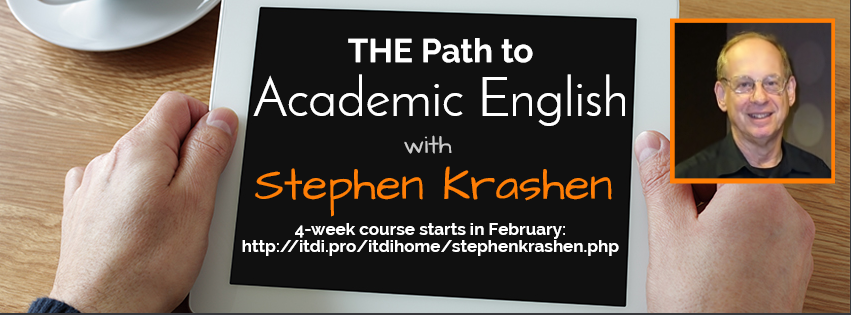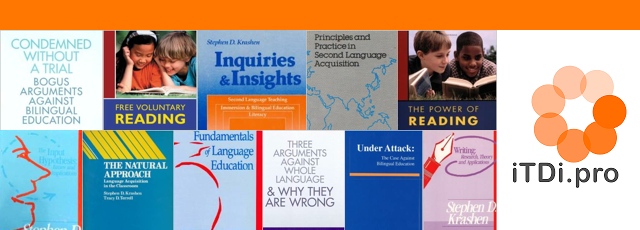Category: The Krashen Issue
Why I Dig Stephen Krashen
 Kevin Stein
Kevin Stein
In political science, the Overton Window is the relatively narrow range of political policy recommendations that are acceptable to the public at any given time. No matter how economically, morally, or scientifically correct a certain policy recommendation might actually be, if it doesn’t fall within the Overton window, the person recommending it will be considered either on the fringe of debate, or even worse, just speaking a bunch of craziness. The Overton Window is a useful concept because it helps us understand how any large community of people evaluates ideas and how new ideas eventually become part of a community’s discourse. We often say that a new idea broadens the debate. But a large heterogeneous group has a limited range of ideas that they are willing to entertain at any particular moment. Debates do not get broadened. Instead, the relatively narrow parameters of the debate simply shift in one direction or the other.
In ELT, policy recommendations are called ‘best practices.’ While the name implies a set of teaching methods which should be implemented in every classroom, ‘best practices’ are closer to the menu of teaching recommendations which a majority of teachers are willing to entertain as both practical and useful. One way to measure the influence of any particular language learning theorist is to keep track of things like how many times they are cited and plot it against the number of critical responses to their ideas over time. But there is another way to measure influence, and that is by trying to see how what they wrote and said has shifted the Overton window in one direction or another .
When people talk (or write) about Stephen Krashen, they most often write about the finer points of how he formulates his hypothesis. This is very normal. They are engaged in an academic debate. So it makes perfect sense that when Stephen writes about how people acquire langue and says:
“How do we move from stage i, where i represents current competence, to i + 1, the next level? The input hypothesis makes the following claim: a necessary (but not sufficient) condition to move from stage i to stage i + 1 is that the acquirer understand input that contains i + 1, where ‘understand’ means that the acquirer is focussed on the meaning and not the form of the message.” (Krashen, 1982, p. 31)
SLA theorists want to know what exactly is “i” and how can we go about measuring ’+1’. But what, perhaps, has gotten lost in dust ups over whether these theories are properly formulated, supported by evidence, or even testable or not, is that Stephen connected and continues to connect these ideas directly to the language classroom. So Stephen doesn’t just walk away after saying learners need understandable input, but expands on the idea by saying that “the best input is so interesting and relevant that the acquirer may even ‘forget’ that the message is encoded in a foreign language. (ibid, p.66)” and “the profession has seriously underestimated the amount of comprehensible input necessary to achieve even moderate, or ‘intermediate’ levels of proficiency in second language acquisition. (ibid, p.71)”
When many people think about Stephen Krashen, they often think of him adamantly arguing that language acquisition happens only through adequate exposure to the comprehensible input, and that this alone is enough for language acquisition. And for many people this becomes the sticking point, the place where they plant their feet and engage with Krashen in debate.
But even as people have busily and sometimes heatedly been arguing over these points, Stephen Krashen has not given up an inch. And even as his detractors have grown increasingly obsessed with knocking down his theories, something pretty remarkable has been happening around them. Teachers and publishers have increasingly worked to find and produce more interesting and engaging texts in which, if content is not the primary concern, it at the very least doesn’t play second fiddle to issues of teachable grammar points. In reading classrooms, teachers spend more time letting students actually read and less time ’teaching’ reading. And in listening classes, very short micro-skills building exercises are designed specifically to optimize learning time and help make as much aural input as possible comprehensible.
I’m not saying that Stephen somehow directly orchestrated all of these changes. It would be pretty hard to untangle all the threads that have been woven together to make the current tapestry of ELT. But what I am saying is that by taking a fairly controversial position and defending and arguing for it at every single opportunity, Stephen has managed to move the Overton window, the ideas that can be entertained as a best practice, more than any other language theorist.
Stephen’s ideas have directly led to the Extensive Reading movement as well as, at least indirectly, influencing text comprehensibility and vocabulary acquisition research. The fact that we can walk into a classroom with some assurance that a text in which 98% of the words are known will allow students a fair chance to understand the remaining 2% from context (Hu & Nation, 2000) is the research driven answer to the question of what actually constitutes ‘i +1’. And it is not just in regards to what makes for good comprehensible input that Stephen’s lingering influence can be felt. Ideas as diverse as avoiding error correction during fluency activities, the importance of learner-autonomy and a need to introduce students to ways to seek out comprehensible input outside of the classroom, and even negotiated syllabus design that eschews a traditional sequenced grammar, are all to some extent influenced by Stephen’s theories.
If you want to know how indebted we are to Stephen Krashen, take the time to reread
Principles and Practice in Second Language Acquisition (http://www.sdkrashen.com/content/books/principles_and_practice.pdf)
and Second Language Acquisition: Theory, Application, and Some Conjectures (http://www.sdkrashen.com/content/articles/krashen_sla.pdf).
And then, before entering your next class, take a moment to just look through the classroom window and appreciate how much richer the learning opportunities for our students are, how much better the view, because of the work Stephen has and continues to do.
References:
Hu, M., & Nation, I.S.P. (2000). Vocabulary density and reading comprehension. Reading in a Foreign Language, 13(1), 403–430.
Krashen, S. (1982). Principles and practice in second language acquisition (pp. 65-78). Pergamon: Oxford. Retrieved from: http://www.sdkrashen.com/content/books/principles_and_practice.pdf.
Get iTDi certified in teaching academic language with Stephen Krashen. Join Stephen Krashen for his iTDi Advanced Course THE Path to Academic English. Live sessions with Dr. Krashen begin February 7th. All classes are recorded.
The Limits of Conscious Grammar: Some Observations by Experts
 Stephen Krashen
Stephen Krashen
The Monitor Hypothesis says that consciously learned language is available as a Monitor, or an editor. We think about rules before we say/write something or after, and make corrections when we realize what we said, or are about to say, is wrong. The conditions for the use of the Monitor are severe: The performer has to (1) Know the rule; (2) Be thinking about correctness (3) Have time to retrieve and apply the rule. (Krashen, S. 1981. Second Language Acquisition and Second Language Learning. New York: Prentice-Hall. Out of Print.)
Over-use of the Monitor (Krashen, 1981) happens when Monitor-use interferes with communication, when we are over-concerned with correctness (Hemingway, 1927; Berra, no date). Knowledge of grammar does not make a significant contribution to communication (Walker, 2002).
Hemingway on the overuse of the Monitor:
“The major, who had been the great fencer, did not believe in bravery, and spent much time while we same in the machines correcting my grammar. He had complimented me on how I spoke Italian, and we talked together very easily. One day I had said that Italian seemed such an easy language to me that I could not take a great interest in it; everything was so easy to say. ‘Why, then, do you not take up the use of grammar?’ So we took up the use of grammar, and soon Italian was such a difficult language that I was afraid to talk to him until I had the grammar straight in my mind.”
Ernest Hemingway, “In Another Country.” In Men without Women, Scribner, paperback fiction. 1997, p. 46-47. Originally published 1927.
Baseball star Yogi Berra on the overuse of the Monitor:
“You can’t think and hit at the same time.”
Limits of grammar knowledge in real production and comprehension.
Letter to the London Times, August 29, 2002
Sir: While my wife (1953 O-level French, fail) happily bargains with French market stallholders, I (1953, A-level French, pass) and only stand by muttering “No, tomatoes are feminine” or “You should be using the subjunctive!”
I was even able, when paying the bill at a small hotel, to say beautifully and accurately in French: “Had we not been awoken at 3am by the dustcart, it would not have been necessary for us to have raided the mini-bar for a bottle of water.”
Unfortunately I had to reply on my wife to understand the reply: “Sorry, but it is still going to cost you 50 francs.”
Yours faithfully,
H.L.M. Walker
Saffron Waldon, Essex.
Subcribe to Stephen Krashen’s Blog where you’ll find this paper and many more on a variety of topics of interest and concern.
Get iTDi certified in teaching academic language with Stephen Krashen. Join Stephen Krashen for his iTDi Advanced Course THE Path to Academic English. Live sessions with Dr. Krashen begin February 7th. All classes are recorded.
What It Takes to Be an Expert Grammar User: Daniel Tammet
 Stephen D. Krashen
Stephen D. Krashen
The case of Daniel Tammet became well known after a documentary, Brainman, was made. It has been shown world-wide since May, 2005. Tammet suffers from savant syndrome, a form of autism characterized by “an obsessive need to order and routine” (Tammet, 2007) and in his case, and extraordinary ability to deal with numbers. The documentary featured his linguistic abilities: After ten days of study of Icelandic, Tammet was able to converse in the language with two native speakers for 15 minutes. Tammet now knows ten languages.
Much of his ability in language acquisition is, without question, really a profound ability in language learning, not acquisition: Tammet has an incredible memory. He holds the European and British record for memorizing pi, at 22,514 digits. (This is, incidentally, sixth in the world. The world record is held by Chao Lu, 67,890; see here for rankings.
It is clear, however, that he uses both learning and acquisition: While studying Lithuanian, while working as an English teacher in Lithuania, he worked with a teacher: “I wrote words down as I learned them to help me visualize and remember them” (conscious learning) and read children’s books . . . (acquisition)” (Tammet, 2007, p. 134). (Parenthetical notes added by SK.)
When he started working on Icelandic, he read texts aloud so his teacher could check his pronunciation (conscious learning), but he also stated that “the large amount of reading helped me to develop an intuitive sense of the language’s grammar (acquisition)” (pp. 208-209).
“When I’m learning a language there are a number of things that I consider essential materials to begin with. The first is a good-size dictionary (conscious learning). I also need a variety of texts in the language, such as children’s books, stories and newspaper articles, because I prefer to learn words within whole sentences to help give me a feeling for how the language works (acquisition)” (p. 161).
Tammet has set up a website, selling lessons in beginning and intermediate Spanish and French. An inspection of the syllabi, available without charge, reveals that the focus of each lesson is a point of grammar.
Before we conclude from this case that the best approach is a combination of acquisition and learning, we have to remember that Daniel Tammet has memorized pi to 22,514 digits. A safer conclusion is that conscious learning works well for those with the prodigious mental powers of Daniel Tammet.
Tammet, D. 2007. Born on a Blue Day. Free Press.
From: Krashen, S. 2012. Seeking a justification for skill-building. In: In: Proceedings of the 19th Annual KOTESOL International Conference, Seoul, Korea, 2011. pp. 13-20 (available online here, scroll down).
Subcribe to Stephen Krashen’s Blog where you’ll find this paper and many more on a variety of topics of interest and concern.

How Stephen Krashen Saved My Job & Why He Still Wants to Save your Children
 Chuck Sandy
Chuck Sandy
I had a tough time in Mrs. Collard’s 2nd grade reading class. Though already a reader with books of my own at home, the skill-based phonics worksheets we were doing in class made no sense to me. Still I struggled along. After one particularly tough day with the worksheets, Mrs. Collard called my mother in to explain that she’d be moving me from the top reading group, the Bluebirds, down to the bottom group, The Sparrows, because I didn’t “get it.” I was devastated, but my mother was just confused. “How could that be? He loves books,” my mother exclaimed. “Maybe so,” said Mrs. Collard, “but he can’t read. Look how poorly he did on these worksheets”. And so my mother looked. Then to Mrs. Collard she said, “but this isn’t reading. This is nonsense” and to me “come on, let’s go” and she took me to the public library and got me a library card. “Now this,” she said, leading me through that room full of books, “this is reading. You can choose up to six books to take home. I’ll be back in an hour.” I went on to eventually read almost every book in that library and came to feel more at home there among books then I ever felt in school.
I tell you this story not just because it’s what launched me into my own work in education, but also to show that even back in 1967 when I was in 2nd grade, schools were busy turning reading instruction into a school subject and by doing so needlessly complicating the whole process. People like my mother recognized this, but the general public became increasingly convinced that the teaching of reading was a science best left to specialists and that education was in crisis because test scores showed that literacy rates were on the decline. No one much ever stopped to consider that this crisis might have originated in the increasingly complicated instruction. Before too long this complicated instruction had became so ingrained in schools that it was almost heresy to call it nonsense.
Fortunately, by the time I got to grad school and later started working in education myself, there were a few researchers brave enough to call out the nonsense. That day in 2nd grade and my years in the library made the work of Kenneth “we learn to read by reading” Goodman, Frank “reading without nonsense” Smith, Tracy “natural approach” Terrell, and Stephen “comprehension hypothesis” Krashen really resonate with me. In fact, reading their work changed my life – especially the work of Krashen. Not only were these researchers unafraid of calling nonsense nonsense, they also had increasingly massive amounts of data to prove it was nonsense. They were (and are) my heroes. I’ll leave it to you to read the research, and I’ll tell you where it led me.
Steeped in all this, determined never to be a Mrs. Collard, and fresh from reading Krashen and Terrell’s The Natural Approach, I found myself in Tokyo in 1984, newly hired by a college to put together an English Language program and given the freedom to pretty much do whatever I wanted. What I wanted in those pre-internet days was for the school to subscribe to multiple copies of fifty different magazines on a wide range of topics and buy a few thousand paperback books. In addition to building a library of interesting books students could borrow, my idea was for each of the twenty of so teachers I worked with to walk into class each day with a basket full of books and magazines, spread them out and say “find something good to read.” What I wanted to do was to run an almost pure free voluntary reading program in which everyone would have lots of time to read lots of interesting things and learn how to talk about the interesting things they read.
I worked for a few weeks on my plan and submitted it to my director of studies.
“How will we know that students are reading,” the director of studies asked?
“We’ll see them reading,” I answered.
“How will we know they’re understanding what they read,” he asked?
“We’ll ask them,” I answered.
“What about testing?” he asked.
“We won’t have any tests,” I answered.
“I’ll have to think this over and discuss it with others,” he said.
A few days later he came back and said something like “there are some who think that maybe you’re not ready to run a program, Mr. Sandy, but if you can prove that all this might be useful, I’m willing to listen”.
Happily, that was the year Stephen Krashen himself was one of the plenary speakers at the Japan Association of Language Teachers (JALT) conference in Tokyo, and so not only did I give my DOS a copy of The Natural Approach, I invited him to join me at JALT to hear Dr. Krashen speak, and he did. After Stephen’s first plenary, my director of Studies leaned over and said, “that man makes good sense, and he’s funny, too”. By the end of the conference, he was so impressed by Stephen Krashen’s work that I not only got to keep my job but also got the money I needed to buy all those books and magazines, then went on to run that program for a couple of years, and learned much more than I can say here doing it. Thank you Stephen.
It’s now almost 50 years since I was in 2nd grade with Mrs. Collard, and more than 30 years since Stephen Krashen’s job-saving plenaries at JALT. It’s therefore sad to have to say that not only does the nonsense about reading instruction continue. It’s even sadder to have to say that it’s gotten worse. In this era of big data, high stakes testing, adaptive learning, and all that nonsense, the nonsense has become dangerous.
It’s therefore wonderful to be able to say that Stephen Krashen is still out there calling nonsense nonsense and providing the data to prove it’s nonsense. In all this time he’s never gone off message, even once. Thank goodness. Today, there’s much more at stake than just reading programs and somebody’s job as you’ll note in this interview with Stephen in Education Week Teacher titled “Stephen Krashen: Children Need Food, Health Care, and Books: Not New Standards and Tests” that I hope you’ll take a few minute to read:
Children Need Food, Heath Care & Books: Not New Standards and Tests
These are the stakes. The lives of our children are at risk and the solutions, as ever, actually are quite simple. Will people ever listen? Let’s hope so.
Get iTDi certified in teaching academic language with Stephen Krashen. Join Stephen Krashen for his iTDi Advanced Course THE Path to Academic English. Live sessions with Dr. Krashen begin February 7th. All classes are recorded.


 The Limits of Conscious Grammar
The Limits of Conscious Grammar  How Stephen Krashen saved my job and why he still wants to save your children
How Stephen Krashen saved my job and why he still wants to save your children

